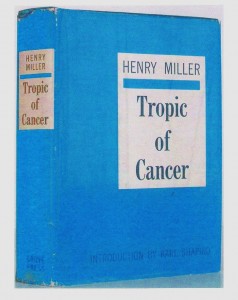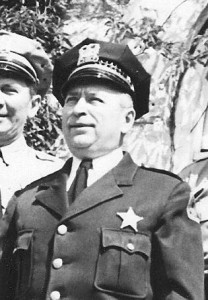Although first published in 1934, Henry Miller’s “Tropic of Cancer” didn’t arrive in Western Springs until 1961. But, when it did, it caused quite a stir.

Tropic of Cancer by Henry Miller
Western Springs is often described as a sort of “Mayberry.” People mention the quaint downtown, the churches seemingly on every corner, and that everyone seems to know everyone else. So, imagine how the town reacted in 1961 when Henry Miller’s “Tropic of Cancer” suddenly appeared at the local newsstand. As background, the book has been described as “notorious for its candid sexuality,” but also as being responsible for the free speech we now take for granted in literature.
The original book, which was published overseas in 1934, had always been banned by U.S. Customs, which had deemed the book obscene. But, in 1961 a publisher decided to sidestep this hurdle by printing it in the United States. And, predictably, the reaction of local authorities was anything but calm. In Western Springs, the book was briefly offered for sale at Clark’s News Stand located at 917 W. Burlington, across the street from the train station. But, almost immediately, Police Chief Charles Petersen “requested” that the book be removed. While telling reporters that he had not arrested anyone or confiscated anything, he explained his actions by saying, “They tell me it’s a very dirty book.”

Police Chief Charles Petersen
Similar police action was taken in Chicago and numerous other suburbs. So, the book’s publisher filed a civil suit in Illinois Superior Court naming Chief Petersen and others as defendants for having restricted the sale of the controversial book. However, Western Springs and seven other towns were subsequently dropped from the suit, presumably to facilitate the prosecution of the case. Meanwhile, the village attorney instructed the police not to interfere with the book’s distribution or sale.
According to news accounts, the case made it all the way to the Illinois Supreme Court. While the Court initially found the book to be obscene, it subsequently annulled its finding. This was because the U.S. Supreme Court had just reversed a similar decision by the Florida Court of Appeals, thereby allowing continued sale of the book.
While Clark’s News Stand continued in business for some years, the storefront is now occupied by a gift shop. But, curious readers need not despair. At last check, the once-controversial book was available at the Thomas Ford Library.
